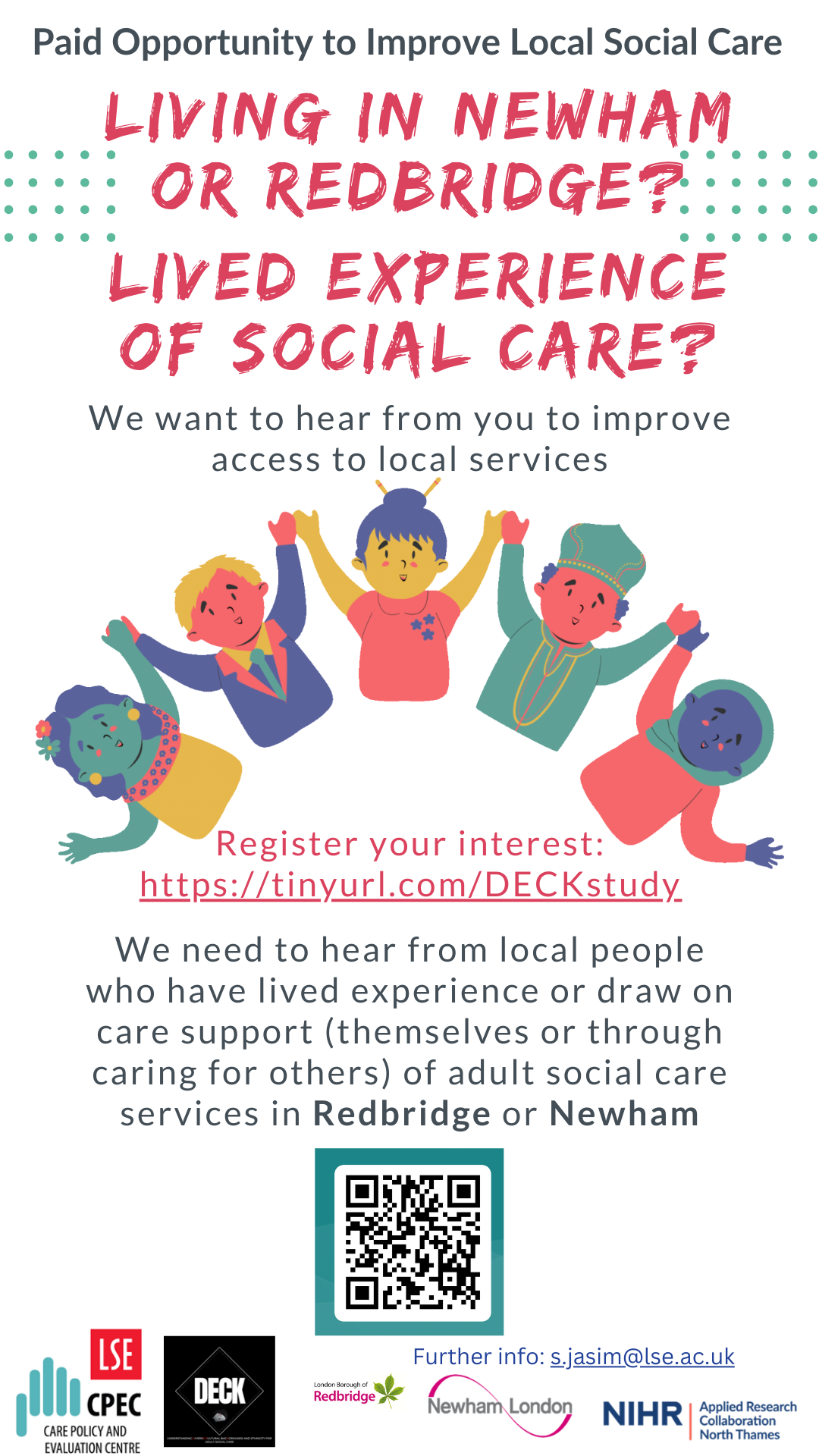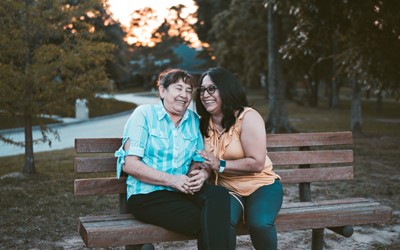Adult social care in England is high on the current political agenda. In 2021, the UK government announced a lifetime cap on eligible care costs and a slightly less harsh means-test for publicly-funded care. While these are important developments which improve the situation for many incurring social care costs, this kind of funding reform largely ignores major underlying care inequalities - especially between people living in more and less deprived areas, and between people with different ethnic backgrounds.
In this blog, Dr Sarah Jasim reflects on a new scoping study, which seeks to understand how diverse cultural backgrounds and ethnicity may act as barriers to access and uptake of local authority commissioned adult social care services in two London Boroughs.
From 2020-21, my colleague, Dr Fiona Aspinal and I undertook several research consultations to build capacity, identify and map key research priorities in adult social care across the North Thames region and surrounding areas. We reached out to all our partners and undertook consultations with adult social care staff from 12 local authorities. One of the key research priorities that emerged from these consultations from 2 local authorities (Newham & Redbridge) was understanding the needs of the local population with regards to why some social care services are taken up by some groups of people, but not others, and if this had anything to do with factors such as ethnicity.
When we began to look a little deeper, we found a recent Department of Health and Social Care (DHSC) review from 2021 which identified a serious lack of information of entitlements and services amongst minoritised people. This shows the large-scale work that must still be done to unpick inequalities in adult social care.
 I am now leading a small scoping study which aims to better understand the influence of diverse cultural backgrounds and ethnicity as barriers to access and uptake of social care services by using realist action research methods. To do this work in a meaningful way, I have:
I am now leading a small scoping study which aims to better understand the influence of diverse cultural backgrounds and ethnicity as barriers to access and uptake of social care services by using realist action research methods. To do this work in a meaningful way, I have:
- Been working in partnerships with local authorities in Newham & Redbridge;
- Recruited a public advisor with lived experience and local knowledge of adult social care in Newham;
- Provided this public advisor with participatory action research training and we have been working together to co-produce the study design, materials and the evaluation component of this study.
I have now started the process to establish 2 groups - an advisory group and a group of local users and carers - to guide the direction and provide local context to the study, as we gather international evidence and a preliminary conceptual framework for diverse cultural backgrounds and ethnicity in the context of the UK social care system.
These groups will be essential to this project, as we begin to undertake a series of observations, semi-structured interviews and ‘meaning making’ workshops with the advisory and local user and carer groups to consider qualitative data to start identifying opportunities for change. These nominal group techniques will hopefully reveal to us the barriers to access and uptake of social care services in these local contexts. We will then move to develop resources and recommendations for local contexts from the perspectives of service-users, carers and practitioners.

JOIN OUR LIVED EXPERIENCE OR ADVISORY GROUP!
The DECK research study is currently recruiting individuals to its Lived Experience Group and Advisory Group to support the plan, shape and deliver its research outcomes.
 The purpose of the Lived Experience Group is to enable individuals with experience of adult social care to provide insights and contribute to an action research study to better understand the influence of diverse cultural backgrounds and ethnicity as barriers to access and uptake of local authority commissioned adult social care services, in the London Boroughs of Newham and Redbridge.
The purpose of the Lived Experience Group is to enable individuals with experience of adult social care to provide insights and contribute to an action research study to better understand the influence of diverse cultural backgrounds and ethnicity as barriers to access and uptake of local authority commissioned adult social care services, in the London Boroughs of Newham and Redbridge.
Up to six people will be selected as members of this Lived Experience Group. Members of this group will help to plan and shape the DECK Research Study. We are looking for members from a wide range of backgrounds with a variety of experiences of adult social care services provided in the London Boroughs of Redbridge & Newham. Group terms of reference can be found in the further links below.
Please scan the QR code to submit an expression of interest to join the group!
---------
 The purpose of the Advisory Group is to enable individuals with professional experience of adult social care to provide insights and contribute to an action research study to better understand the influence of diverse cultural backgrounds and ethnicity as barriers to access and uptake of local authority commissioned adult social care services, in the London Boroughs of Newham and Redbridge. Members of this group will help to plan and shape the DECK Research Study. We are looking for members from a wide range of backgrounds with a variety of professional experiences of adult social care services provided in the London Boroughs of Redbridge & Newham. Group terms of reference can be found in the further links below.
The purpose of the Advisory Group is to enable individuals with professional experience of adult social care to provide insights and contribute to an action research study to better understand the influence of diverse cultural backgrounds and ethnicity as barriers to access and uptake of local authority commissioned adult social care services, in the London Boroughs of Newham and Redbridge. Members of this group will help to plan and shape the DECK Research Study. We are looking for members from a wide range of backgrounds with a variety of professional experiences of adult social care services provided in the London Boroughs of Redbridge & Newham. Group terms of reference can be found in the further links below.
Please scan the QR code to submit an expression of interest to join the group or email s.jasim@lse.ac.uk.

 29 Sep 2023
29 Sep 2023
